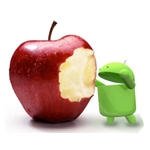
Google is taking its move a step forward. As a company, Google is growing up. However, Google that has long been one of the most profitable digital enterprises, until now its software success has been achieved on machines made by other people.
Both Google and Apple are the two dominant mobile device operating system makers. The competition has brought out the best of the best to all phone users. The fact that Apple has a strong hold in the creation of electronic components does not mean that it cannot face the stiff competition when it comes to meeting the most widely used search giant and multinational internet and software corporation.
Google, founded in 1998 by Larry Page and Sergey Brin has not run a retail empire or factories. It has not had to manage a physical distribution network, or provide a public customer services helpline.
While its products reach around the world, they do so virtually - often slipping through the nets that states have designed to contain more tangible businesses on issues such as tax or copyright.
This year in 2013, Google will begin recruiting a 2,000 workforce to assemble mobile devices at a plant outside Fort Worth in Texas. From there, it will make what it claims are the only American-assembled smartphones.
Google is ready to take on Apple in every way: not only with its already-bestselling Android mobile devices, but by designing and assembling a machine to run it. And, as Apple begins to look like it is running out of ideas, Google is eager to prove it can become the new digital trendsetter.
In 2012, when Google bought Motorola, everyone assumed it was for the patents. But Google's was much more ambitious. Apple's success has been built on being able to control both the hardware and the software. Now Google will go even the odds by controlling the manufacturing as well.
Has Google grown up enough to become the new Apple? Google's co-founders have proved they can disrupt. By having in the world's information and making it retrievable, Google's search engine has shaken the media industry to its foundations. Despite being launched after Apple's iOS, Android has become the international standard. Three-quarters of the smartphones sold in the first three months of 2013 run it.
The two companies will go head to head with their own strategies. Apple is overhauling its iOS, and will release updated versions of iPads, iPhones, and its music store iTunes.
But technology's new battleground is not the just about the small screen inside everyone's pocket. It is wearable processing power: the computerized Google Glass Brin is sporting in many places in the hope of making the device fashionable. And on the same time, the smart "watch" Apple is reportedly developing.
Google's founders have proved that they can, just like Apple, create disruptive technology that works. Although both companies are moving in the same industry, they are both playing in different leagues. But to these abilities Steve Jobs added a flair for design and presentation that made his products desirable. Apple's stores are built to feel like palatial art galleries. And when Google did have one, people could imagine it looking more like a cheap and cheerful market.